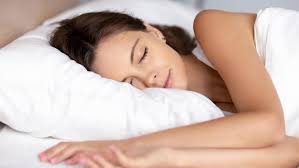
Sleep is essential and necessary for all living things. It is not simply about rest, enjoyment, and quiet solitude. Healthy sleep hygiene results in strong overall health. During a good quality sleep is the time when the body is rejuvenated and recharged. The role of sleep has been linked to memory and learning as well as many functions of the body to repair and regenerate tissues, to strengthen the immune system, and in building bone and muscle. Poor sleep is linked to an increase in mortality and other health problems such as high blood pressure, obesity, heart attack, stroke, and mood disorders (Porter, 2019).
Ancient traditional medical practices support the power of sleep and the mind body connection. Ayurveda is a mind body medicine that is receiving renewed interest in its application to sleep disorders. The Chopra Center is a research institute that develops practices based on Ayurveda principles to aid in sleep disorders. As well, there are mind body practices that have been researched to understand their impact on improving sleep and overall health.
Effective Mind Body Medicine Treatments for Sleep Disorders
Learning about healthy sleep hygiene and relaxation methods has been one effective mind body medicine practice for sleep disorders. Vincent and Lewycky (2009) studied over 100 adults with chronic insomnia. They offered an intervention that consisted of online education about sleep hygiene and stimulus control. The results were that the treatment “produced improvements in the primary end points of sleep quality” and the severity of insomnia and daytime fatigue were noticeably reduced, as well as “dysfunctional beliefs about sleep” (Vincent and Lewycky, 2009).
In the research by Irwin et al. (2008), over 100 older adults with moderate sleep complaints learned about sleep and health education, along with Tai Chi Chih practice. Subjects showed improvements using the Pittsburgh Sleep Quality Index. The sleep patterns of the participants improved in duration, efficiency and less sleep disturbances.
In a comparison between use of a placebo and health education on sleep, the study by Soeffing et al. (2008) experimented with over 40 older adults with chronic insomnia. The intervention consisted of sleep health education, 7.5-mg of zopiclone nightly or placebo medication. Over six months the three groups sleep patterns were tracked. The group that learned about sleep hygiene had better sleep patterns and efficiency than those taking the placebo and the zopliclone, though the total sleep time was similar across all three groups.
Other researchers found that sleep health education was enough for greater sleep efficiencies and in reducing sleep disturbances for people suffering from sleep disorders (Carney et al., 2003; Goodwin et al, 2004; Irwin et al., 2008; Jarrin et al., 2013; Lichstein et al, 2001; Waters et al., 2011).
In addition to health education about sleep hygiene, other mind body practices have shown success in treating sleep disorders. Harmat et al. (2008) in a study with 94 college students with sleep complaints looked at the use of classical music or audiobook, versus no intervention for improving sleep. Using a sleep quality scale, students who listened to classical music showed significantly improved sleep quality over the other two groups. In a study by Manjunath and Telles (2005) 120 older adults used yoga, herbal medicine, versus a control group who did not change their sleep habits. The group who used yoga saw significant improvement in sleep habits including decrease in length of time to fall asleep, increase in total numbers of hours asleep, and overall feeling of being rested after rising in the morning even up to six months after treatment. In another study by Lichstein et al. (2001) 89 older adults with insomnia were treated with the intervention of relaxation practices, sleep compression, or placebo desensitization. Sleep compression was found to be most effective, but all intervention showed improved self-reported sleep, though objective sleep was unchanged. Not all mind body interventions have shown success. Pallesen et al (2003) conducted a study with 55 older adults with insomnia. The group was provided with education about sleep hygiene, stimulus reduction, and the control group was provided with relaxation recordings. There was no difference between the two groups after the interventions.
Sleep Health Education and Self-care in College
The evidence-based practices that support mind body medicine is overwhelmingly positive. Many people have dysfunctional beliefs about the importance of sleep. For many students, the amount of time spent on sleep is considered unnecessary and expendable. As a teacher in a college prep class for inner-city youth in Oakland, CA, when I discussed the concept of “pulling an all-nighter” to high school students in my class they seemed very excited and eager to try it and saw it as being a risk-taker or as a rite of passage. Students rarely understand the damage that sleep deprivation can wreak on health. Rarely do students understand that it takes days of proper maintenance to recover from loss of sleep.
To support sleep hygiene in one’s self-care practice, students must reflect on their own sleep practices. A mindfulness practice can show how to pay close attention to their sleep cycle and be attuned to see the connection between their decisions about time management and how those decisions impact sleep habits. As well, students can develop a sleep plan. Students can discuss ways to reduce distractions and the importance of a regular sleep schedule. Oftentimes, students have false beliefs and misinformation about the amount of sleep that is necessary for proper brain and memory function. Learning about self-care and sleep is a way to develop personal resources and documentation for students to utilize recent research to optimize the importance of sleep hygiene.
Here is a case-study to highlight the importance of sleep. A college student was a workaholic in high school, she did sports, drama, and excelled in the classroom. The student was admitted to University of California, Berkeley after graduating high school. She got very interested in public policy development. She got admitted to a program called PPIA, where she spent a summer at Princeton University to study policy development. She would drink gallons of coffee each day to keep up with the demands of the program. Eventually this student graduated from UC Berkeley as a double major. Then she was admitted to graduate school at the Princeton University Woodrow Wilson School of Public Policy for her master’s degree. This student would study way too much and never got enough sleep. One day she was riding her bike back from the library in the dead of night. She fell asleep on her bike and crashed on her way back to her dorm. Her life could have ended that night due to lack of sleep.
Luckily she only suffered minor scraps and bruises. She lived to study another day. She graduated from Princeton University with a Master’s Degree in Public Policy and Urban Development, the student then went on to Johns Hopkins University to complete her doctorate in Sociology.
This student’s story is a vivid reminder of how easy it is for us to take sleep for granted. She worked so hard to be successful, but her life could have very easily ended that night because her body completely shut down as she was riding her bike on that road. That cautionary story underscores how important it is to promote sleep hygiene and mind body practices that can help students get the sleep that the body naturally desires.
References
Carney, C. E., Edinger, J. D., Meyer, B., Lindman, L., & Istre, T. (2006). Daily activities and sleep quality in college students. Chronobiology international, 23(3), 623-637.
Edinger, J. D., Wohlgemuth, W. K., Radtke, R. A., Marsh, G. R., & Quillian, R. E. (2001). Does cognitive-behavioral insomnia therapy alter dysfunctional beliefs about sleep?. Sleep, 24(5), 591-599.
Goodwin, J. L., Kaemingk, K. L., Fregosi, R. F., Rosen, G. M., Morgan, W. J., Smith, T., & Quan, S. F. (2004). Parasomnias and sleep disordered breathing in Caucasian and Hispanic children–the Tucson children’s assessment of sleep apnea study. BMC medicine, 2(1), 14.
Harmat, L., Takács, J., & Bodizs, R. (2008). Music improves sleep quality in students. Journal of advanced nursing, 62(3), 327-335.
Irwin, M. R., Olmstead, R., & Motivala, S. J. (2008). Improving sleep quality in older adults with moderate sleep complaints: a randomized controlled trial of Tai Chi Chih. Sleep, 31(7), 1001-1008.
Jarrin, D. C., McGrath, J. J., Silverstein, J. E., & Drake, C. (2013). Objective and subjective socioeconomic gradients exist for sleep quality, sleep latency, sleep duration, weekend oversleep, and daytime sleepiness in adults. Behavioral sleep medicine, 11(2), 144-158.
Lichstein, K. L., Riedel, B. W., Wilson, N. M., Lester, K. W., & Aguillard, R. N. (2001). Relaxation and sleep compression for late-life insomnia: a placebo-controlled trial. Journal of consulting and clinical psychology, 69(2), 227.
Manjunath, N. K., & Telles, S. (2005). Influence of Yoga & Ayurveda on self-rated sleep in a geriatric population. Indian Journal of Medical Research, 121(5), 683.
Pallesen, S., Saxvig, I. W., Molde, H., Sørensen, E., Wilhelmsen-Langeland, A., & Bjorvatn, B. (2011). Brief report: behaviorally induced insufficient sleep syndrome in older adolescents: prevalence and correlates. Journal of adolescence, 34(2), 391-395.
Porter, V. (2019) A Mind-body Prescription for Restful Sleep. Retrieved on March 19, 2019. https://chopra.com/articles/mind-body-perscription-restful-sleep
Soeffing, J. P., Lichstein, K. L., Nau, S. D., McCrae, C. S., Wilson, N. M., Aguillard, R. N., … & Bush, A. J. (2008). Psychological treatment of insomnia in hypnotic-dependant older adults. Sleep Medicine, 9(2), 165-171.
Vincent, D., & Lewycky, S. E. (2009). Research Forum. Behavior Therapist, 32(6).
Waters, F., & Bucks, R. S. (2011). Neuropsychological effects of sleep loss: implication for neuropsychologists. Journal of the International Neuropsychological Society, 17(4), 571-586.

